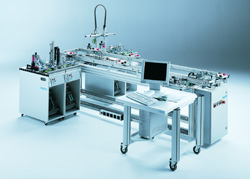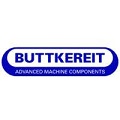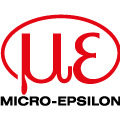
Posted to News on 7th Feb 2007, 19:12
Robotic production system used to teach students
A Festo MPS 500 modular production system has been installed by the Product Design and Engineering Academic Group of Middlesex University for teaching undergraduates and graduates about all aspects of industrial automation.

Middlesex University has installed a Festo MPS 500 modular production system at its Trent Park campus. The system facilitates hands-on training for students pursuing undergraduate and postgraduate programmes in product design and engineering. Although it only occupies some 16m2 floor space, the system embraces every aspect of manufacturing automation, and includes nine different PLC-controlled automated production stages and an intelligent conveyor system.
Product Design and Engineering Academic Group (PDE), based at the Trent Park campus, is widely acknowledged to be one the UK's most innovative providers of product design education and has established an excellent reputation within the engineering community for its focus on industry needs. The PDE Academic Group employs 15 full-time academic and technical staff, and its on-site manufacturing centre is equipped with an extensive range of high-end production systems, including CNC milling, turning, rapid prototyping, 3D scanning and laser cutting facilities. PDE Academic Group is one of only a handful of universities in the country with an FDM (fused deposition method) rapid prototyping machine that can create 3D plastic objects direct from CAD data.
According to Dr Mehmet Karamanoglu, Product Design and Engineering Academic Group Chair at Trent Park, "We have used Festo equipment at the university since 1996 to help familiarise students with the type of pneumatic and electrical automation used in manufacturing environments. The MPS 500 installation represents a significant investment for the university and underlines our commitment to providing our students with access to the very latest training technology. Students who have benefited from using real-life automation are better prepared for industry and find employers more receptive. Furthermore, we are keen to extend our role to serve the needs of local industry, and for this we need to ensure that we are operating the latest-generation equipment."
Modular automation
MPS 500 systems are inherently modular, enabling organisations to configure them with exactly what they need for training purposes. The Trent Park installation is a particularly comprehensive set-up, designed to replicate virtually every aspect of a typical automated manufacturing system. It comprises nine different PLC-controlled stations, covering selection, sorting and distribution, testing, processing, assembly, vision inspection, handling, retrieval and storage. An intelligent conveyor system is used to transfer components or assemblies from one station to another.
The distribution station employs pneumatic and electro-pneumatic linear and rotary actuators, the testing station introduces sensing components – including optical and capacitive transducers – and the processing station is based entirely on electrical technology, including AC and DC servo drives and stepper motors. The vision inspection station employs a high-speed camera and is capable of evaluating a variety of parameters, including the colour and physical dimensions of objects moving past it.
Between them, the stations encompass all aspects of mainstream mechatronics and provide an excellent platform for analysing, understanding and mastering the interaction of mechanics, pneumatics, electrical engineering, control technology and communication interfaces.
Integrated or standalone modules
Each automation station can either form an integral part of the entire production process, or it can be physically separated for standalone use. This reconfiguration flexibility provides the university with a key advantage, as Dr Karamanoglu explains: "We often need to tailor programmes to suit the training requirements of particular groups of students or industry sponsors, which makes Festo's MPS 500 the ideal tool for this task, because we can customise the system accordingly."
The Trent Park facility operates a number of computer workstations, running Festo's powerful Mechatronics Assistant software. These are linked via Ethernet to the automation stations, with the entire network overseen by a host SCADA system. The workstations can either be used autonomously, running simulation software, or on-line to control the various stages of the MPS 500.
Steve Stratfull, Training Manager for Festo Didactic, points out that Middlesex University is one of eight Festo-approved training centres in the UK: "The university runs courses that are complementary to those offered by our Didactic Centre in Northampton, and has similar objectives and ideals. We strongly believe in promoting training and skill acquisition to help people secure career paths in technology, and are delighted to be associated with the university's initiatives in this area."






























